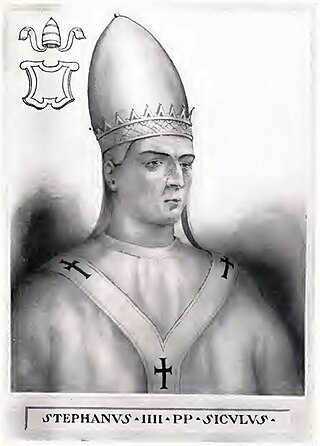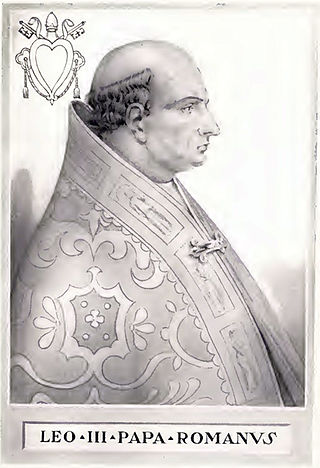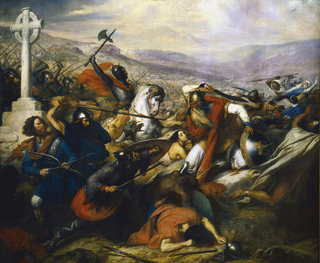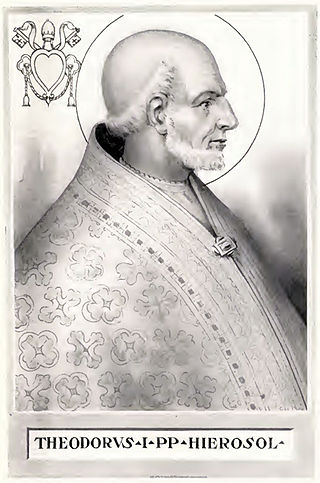
Year 768 (DCCLXVIII) was a leap year starting on Friday of the Julian calendar. The denomination 768 for this year has been used since the early medieval period, when the Anno Domini calendar era became the prevalent method in Europe for naming years.
The 800s decade ran from January 1, 800, to December 31, 809.
Year 800 (DCCC) was a leap year starting on Wednesday of the Julian calendar, the 800th year of the Common Era (CE) and Anno Domini (AD) designations, the 800th year of the 1st millennium, the 100th and last year of the 8th century, and the 1st year of the 800s decade. It was around this time that the Anno Domini calendar era became the prevalent method in Europe for naming years, so from this time on, the years began to be known as 800 and onwards.
The 790s decade ran from January 1, 790, to December 31, 799.

Year 816 (DCCCXVI) was a leap year starting on Tuesday of the Julian calendar, the 816th year of the Common Era (CE) and Anno Domini (AD) designations, the 816th year of the 1st millennium, the 16th year of the 9th century, and the 7th year of the 810s decade.

Year 754 (DCCLIV) was a common year starting on Tuesday of the Julian calendar, the 754th year of the Common Era (CE) and Anno Domini (AD) designations, the 754th year of the 1st millennium, the 54th year of the 8th century, and the 5th year of the 750s decade. The denomination 754 for this year has been used since the early medieval period, when the Anno Domini calendar era became the prevalent method in Europe for naming years.

Year 795 (DCCXCV) was a common year starting on Thursday of the Julian calendar. The denomination 795 for this year has been used since the early medieval period, when the Anno Domini calendar era became the prevalent method in Europe for naming years.

Year 808 (DCCCVIII) was a leap year starting on Saturday of the Julian calendar, the 808th year of the Common Era (CE) and Anno Domini (AD) designations, the 808th year of the 1st millennium, the 8th year of the 9th century, and the 9th year of the 800s decade.
Year 801 (DCCCI) was a common year starting on Friday of the Julian calendar, the 801st year of the Common Era (CE) and Anno Domini (AD) designations, the 801st year of the 1st millennium, the 1st year of the 9th century, and the 2nd year of the 800s decade.

Year 778 (DCCLXXVIII) was a common year starting on Thursday of the Julian calendar, the 778th year of the Common Era (CE) and Anno Domini (AD) designations, the 778th year of the 1st millennium, the 78th year of the 8th century, and the 9th year of the 770s decade. The denomination 778 for this year has been used since the early medieval period, when the Anno Domini calendar era became the prevalent method in Europe for naming years.

Year 784 (DCCLXXXIV) was a leap year starting on Thursday of the Julian calendar, the 784th year of the Common Era (CE) and Anno Domini (AD) designations, the 784th year of the 1st millennium, the 84th year of the 8th century, and the 5th year of the 780s decade. The denomination 784 for this year has been used since the early medieval period, when the Anno Domini calendar era became the prevalent method in Europe for naming years.

Year 790 (DCCXC) was a common year starting on Friday of the Julian calendar, the 790th year of the Common Era (CE) and Anno Domini (AD) designations, the 790th year of the 1st millennium, the 90th year of the 8th century, and the 1st year of the 790s decade. The denomination 790 for this year has been used since the early medieval period, when the Anno Domini calendar era became the prevalent method in Europe for naming years.

Year 796 (DCCXCVI) was a leap year starting on Friday of the Julian calendar, the 796th year of the Common Era (CE) and Anno Domini (AD) designations, the 796th year of the 1st millennium, the 96th year of the 8th century, and the 7th year of the 790s decade. The denomination 796 for this year has been used since the early medieval period, when the Anno Domini calendar era became the prevalent method in Europe for naming years.

Year 797 (DCCXCVII) was a common year starting on Sunday of the Julian calendar. The denomination 797 for this year has been used since the early medieval period, when the Anno Domini calendar era became the prevalent method in Europe for naming years.

Year 732 (DCCXXXII) was a leap year starting on Tuesday of the Julian calendar, the 732nd year of the Common Era (CE) and Anno Domini (AD) designations, the 732nd year of the 1st millennium, the 32nd year of the 8th century, and the 3rd year of the 730s decade. The denomination 732 for this year has been used since the early medieval period, when the Anno Domini calendar era became the prevalent method in Europe for naming years.

700 (DCC) was a leap year starting on Thursday of the Julian calendar, the 700th year of the Common Era (CE) and Anno Domini (AD) designations, the 700th year of the 1st millennium, the 100th and last year of the 7th century, and the 1st year of the 700s decade. As of the start of 700, the Gregorian calendar was 3 days ahead of the Julian calendar, which was the dominant calendar of the time.

Year 642 (DCXLII) was a common year starting on Tuesday of the Julian calendar. The denomination 642 for this year has been used since the early medieval period, when the Anno Domini calendar era became the prevalent method in Europe for naming years.

Coenwulf was the king of Mercia from December 796 until his death in 821. He was a descendant of King Pybba, who ruled Mercia in the early 7th century. He succeeded Ecgfrith, the son of Offa; Ecgfrith only reigned for five months, and Coenwulf ascended the throne in the same year that Offa died. In the early years of Coenwulf's reign he had to deal with a revolt in Kent, which had been under Offa's control. Eadberht Præn returned from exile in Francia to claim the Kentish throne, and Coenwulf was forced to wait for papal support before he could intervene. When Pope Leo III agreed to anathematise Eadberht, Coenwulf invaded and retook the kingdom; Eadberht was taken prisoner, was blinded, and had his hands cut off. Coenwulf also appears to have lost control of the kingdom of East Anglia during the early part of his reign, as an independent coinage appears under King Eadwald. Coenwulf's coinage reappears in 805, indicating that the kingdom was again under Mercian control. Several campaigns of Coenwulf's against the Welsh are recorded, but only one conflict with Northumbria, in 801, though it is likely that Coenwulf continued to support the opponents of the Northumbrian king Eardwulf.
Eardwulf was king of Northumbria from 796 to 806, when he was deposed and went into exile. He may have had a second reign from 808 until perhaps 811 or 830. Northumbria in the last years of the eighth century was the scene of dynastic strife between several noble families: in 790, king Æthelred I attempted to have Eardwulf assassinated. Eardwulf's survival may have been viewed as a sign of divine favour. A group of nobles conspired to assassinate Æthelred in April 796 and he was succeeded by Osbald: Osbald's reign lasted only twenty-seven days before he was deposed and Eardwulf became king on 14 May 796.
Events from the 8th century in England.














